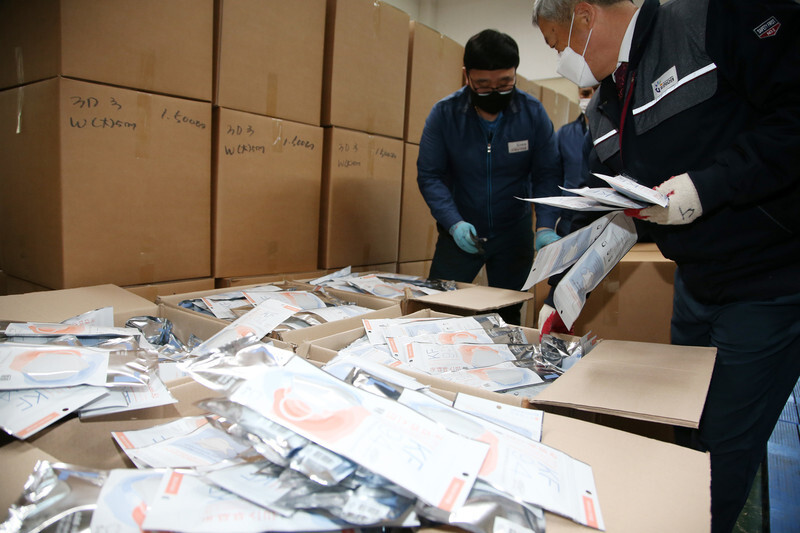hankyoreh
Links to other country sites 다른 나라 사이트 링크
S. Korean government says cloth masks are somewhat effective at blocking infections

In response to an ongoing debate over whether cloth masks are effective at preventing novel coronavirus infections, the Ministry of Food and Drug Safety (MFDS) responded in the affirmative. This marks the first time the South Korean government has acknowledged the effectiveness of cloth masks in blocking the virus’s spread. But the conclusion was not based on concrete testing, and no explanation was given on the extent to which the masks prevent the virus from spreading.
In a briefing on the afternoon of Mar. 16, Minister of Food and Drug Safety Lee Eui-kyung was asked by reporters about the effectiveness of cloth masks in infection prevention.
“Droplets [of saliva] are relatively large, so there is some degree of blocking effect [with cloth masks],” she replied.
“The coronavirus virus measures about 120 nanometers and has a lot of protuberances on its surface, so the cloth masks are believed to function as a kind of net that produces some blocking effect,” she explained.
In a revision of its mask usage recommendations on Mar. 3, the MFDS said that the use of cloth masks was helpful only in “situations where the infection risk is not high or no medical masks are available.” Lee’s response shared the reasons for the masks’ effectiveness under the same assumptions. At the same time, she did not mention the extent to which the masks are effective in blocking the virus’s transmission. The MFSD explained, “[Lee] was saying that this is the case scientifically if you look at the shape of the virus. [Her conclusion] has not gone through an experimental process.”
Meanwhile, Lee also said that “KF94 masks currently account for 93-94% of production volumes, and we’re focusing on a policy direction of increasing the number of KF80 masks.” The message indicates plans to promote production of KF80 masks, which can be produced in large volumes while using fewer raw materials than KF94 masks. The government’s conclusion is that while the transmission prevention capabilities of the KF80 masks are slightly lower, they are acceptable for members of the public to use apart from cases where people are caring for suspected coronavirus patients.
By Noh Ji-won, staff reporter
Please direct comments or questions to [english@hani.co.kr]

Editorial・opinion
![[Editorial] Korea must respond firmly to Japan’s attempt to usurp Line [Editorial] Korea must respond firmly to Japan’s attempt to usurp Line](https://flexible.img.hani.co.kr/flexible/normal/500/300/imgdb/original/2024/0514/2317156736305813.jpg) [Editorial] Korea must respond firmly to Japan’s attempt to usurp Line
[Editorial] Korea must respond firmly to Japan’s attempt to usurp Line![[Editorial] Transfers of prosecutors investigating Korea’s first lady send chilling message [Editorial] Transfers of prosecutors investigating Korea’s first lady send chilling message](https://flexible.img.hani.co.kr/flexible/normal/500/300/imgdb/original/2024/0514/7917156741888668.jpg) [Editorial] Transfers of prosecutors investigating Korea’s first lady send chilling message
[Editorial] Transfers of prosecutors investigating Korea’s first lady send chilling message- [Column] Will Seoul’s ties with Moscow really recover on their own?
- [Column] Samsung’s ‘lost decade’ and Lee Jae-yong’s mismatched chopsticks
- [Correspondent’s column] The real reason the US is worried about Chinese ‘overcapacity’
- [Editorial] Yoon’s gesture at communication only highlights his reluctance to change
- [Editorial] Perilous stakes of Trump’s rhetoric around US troop pullout from Korea
- [Guest essay] Preventing Korean Peninsula from becoming front line of new cold war
- [Column] The state is back — but is it in business?
- [Column] Life on our Trisolaris
Most viewed articles
- 1[Editorial] Transfers of prosecutors investigating Korea’s first lady send chilling message
- 2Korea cedes No. 1 spot in overall shipbuilding competitiveness to China
- 3Korean opposition decries Line affair as price of Yoon’s ‘degrading’ diplomacy toward Japan
- 4[Editorial] Korea must respond firmly to Japan’s attempt to usurp Line
- 5[Column] Will Seoul’s ties with Moscow really recover on their own?
- 6US has always pulled troops from Korea unilaterally — is Yoon prepared for it to happen again?
- 7Major personnel shuffle reassigns prosecutors leading investigations into Korea’s first lady
- 8[Photo] Korean students protest US complicity in Israel’s war outside US Embassy
- 9Naver’s union calls for action from government over possible Japanese buyout of Line
- 10For prestigious university admission, S. Korean students and parents in a war for information